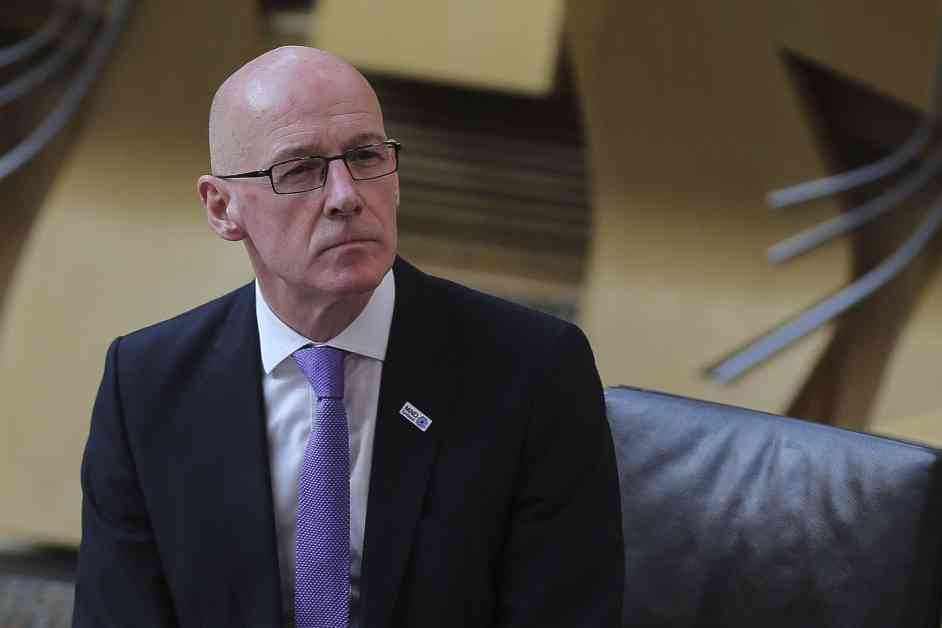First Minister John Swinney recently held a virtual meeting with Dr. Husam Zomlot, the head of the Palestine Mission to the United Kingdom. The discussion centered around the humanitarian situation in Gaza, Holyrood’s support for a ceasefire, and the safe return of hostages held by Hamas. Mr. Swinney expressed his unwavering support for an immediate humanitarian ceasefire in Gaza, the release of all hostages, and the recognition of a sovereign and viable Palestinian state within a two-state solution. He emphasized the importance of Israelis and Palestinians living in peace alongside each other.
The meeting between Mr. Swinney and Dr. Zomlot was arranged before July’s general election but comes at a crucial time for the SNP amidst a controversy surrounding the conflict in the Middle East. The Scottish Government has long called for recognition of Palestine and the opening of an embassy in the region, despite the UK government’s reluctance to formally recognize Palestine as a state.
While the House of Commons voted for recognition in 2014, Prime Minister Keir Starmer has stated that any move to do so must be done at the right time in the process. The Scottish Government’s stance on the issue has been clear, with calls for recognition and support for the Palestinian cause.
In the midst of these discussions, External Affairs Secretary Angus Robertson faced criticism for meeting with Israel’s deputy ambassador to the UK, Daniela Grudsky. The meeting sparked controversy within the party, as Mr. Robertson’s actions were seen as contradictory to the SNP’s longstanding call for a ceasefire in Gaza.
Similarly, Glasgow Shettleston MSP John Mason faced backlash for meeting with Ms. Grudsky and making controversial comments on social media regarding the conflict. His remarks dismissing accusations of genocide by Israel led to the withdrawal of his party whip, highlighting the sensitive nature of the issue and the importance of maintaining a united front within the SNP.
The conflict in the Middle East has escalated in recent months, with Israel launching an offensive on the occupied Gaza Strip in response to attacks by Hamas militants. The violence has resulted in a significant loss of life, with civilians bearing the brunt of the casualties. The international community has been closely monitoring the situation, with calls for a ceasefire and efforts to address the humanitarian crisis in Gaza.
As the occupying power, Israel has a clear obligation under international law to ensure the basic needs of Gaza’s population are met. However, reports from organizations like Human Rights Watch and Amnesty International suggest that Israel has failed to provide for these needs and has obstructed the passage of aid into the region. This has led to further criticism of Israel’s actions and calls for accountability for potential violations of international law.
The International Court of Justice (ICJ) has been involved in the conflict, issuing orders to prevent acts that would contravene international conventions. Despite these orders, Israel has been accused of failing to comply with the ICJ’s rulings and continuing its military offensive in Gaza. The court’s involvement is crucial in holding parties accountable for their actions and ensuring justice for those affected by the conflict.
In the face of these challenges, the Scottish Government’s engagement with stakeholders in the region is essential in promoting dialogue and advocating for peaceful resolutions to the conflict. The recent meeting between Mr. Swinney and Dr. Zomlot underscores the importance of diplomatic efforts in addressing the humanitarian crisis in Gaza and supporting the Palestinian cause.
Moving forward, it is imperative for all parties involved to prioritize the well-being of civilians in the region and work towards a sustainable solution that upholds human rights and promotes peace. The international community must continue to pressure all sides to engage in constructive dialogue and seek peaceful resolutions to the conflict in the Middle East.
Support for Ceasefire and Humanitarian Aid
The Scottish Government’s support for an immediate humanitarian ceasefire in Gaza reflects its commitment to addressing the humanitarian crisis in the region. The ongoing violence has resulted in a significant loss of life and has exacerbated the suffering of civilians, particularly women and children.
Efforts to facilitate the safe return of hostages held by Hamas are crucial in ensuring the protection of innocent individuals caught in the crossfire of the conflict. The Scottish Government’s advocacy for the release of hostages and the recognition of a sovereign and viable Palestinian state within a two-state solution demonstrates its commitment to promoting peace and stability in the region.
Challenges and Opportunities for Diplomatic Engagement
The recent meeting between Mr. Swinney and Dr. Zomlot highlights the challenges and opportunities for diplomatic engagement in the Middle East conflict. As tensions escalate and violence continues to escalate, diplomatic efforts are essential in de-escalating the situation and promoting dialogue between all parties involved.
The Scottish Government’s stance on the conflict underscores its commitment to upholding human rights and advocating for peaceful resolutions to the crisis. By engaging with stakeholders in the region and supporting initiatives that promote peace and stability, the Scottish Government plays a crucial role in mitigating the impact of the conflict on civilians and fostering a climate of cooperation and dialogue.
Call for International Accountability and Justice
The involvement of international bodies like the International Court of Justice in addressing the conflict in the Middle East is crucial in holding parties accountable for their actions and ensuring justice for those affected by the violence. The ICJ’s orders to prevent acts that contravene international conventions are a step towards promoting accountability and upholding human rights in the region.
As the conflict continues to unfold, the international community must remain vigilant in monitoring the situation and advocating for peaceful resolutions to the crisis. By supporting initiatives that promote dialogue and cooperation between all parties involved, the international community can work towards a sustainable solution that prioritizes the well-being of civilians and upholds human rights in the region.
































